Case Study Analysis: MAN501 - Kingsgate Hotel Front Office Management
VerifiedAdded on 2022/08/13
|6
|1408
|19
Case Study
AI Summary
This case study analyzes the management practices of Lea, the front office manager at Kingsgate Hotel, addressing staff shortages, communication breakdowns, system failures, and the development of positive working relationships. The analysis applies management theories, including Fayol's functions (planning, organizing, commanding, coordinating, controlling), POLC functions, and Katz's managerial skills (human, technical, conceptual), to evaluate Lea's actions and effectiveness. The case study explores Lea's ability to organize, command, and control in response to staffing issues, her coordination and leadership skills in addressing communication problems, and her technical skills in managing system failures. It also examines her use of patience to build relationships with other employees. The reflection section evaluates Lea's overall performance, highlighting her strengths and suggesting improvements in communication, employee management, and relationship-building skills to enhance her effectiveness as a front desk manager. The document provides a detailed examination of how management theories are applied to real-world situations and offers practical insights into effective leadership and problem-solving in a hotel environment.
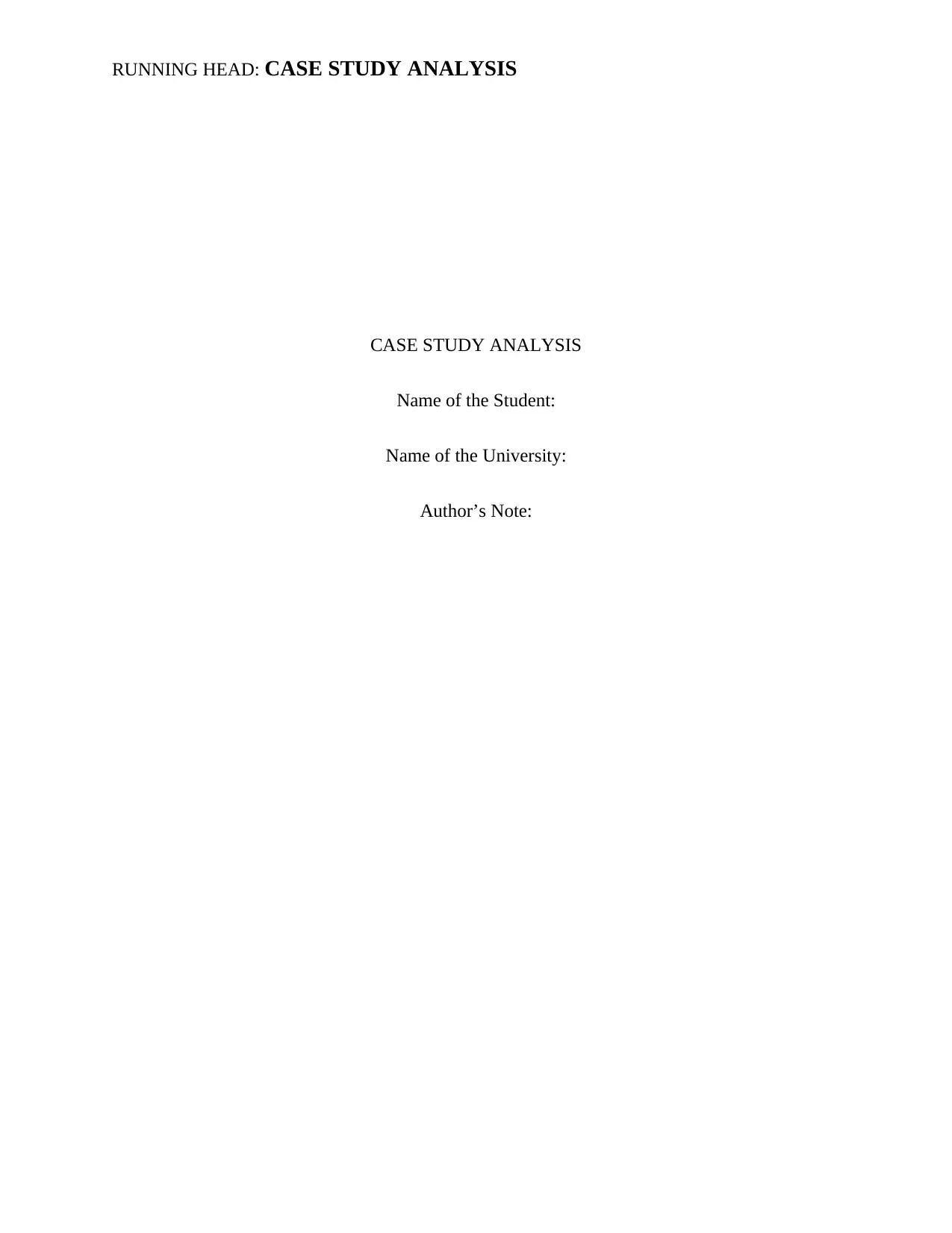
RUNNING HEAD: CASE STUDY ANALYSIS
CASE STUDY ANALYSIS
Name of the Student:
Name of the University:
Author’s Note:
CASE STUDY ANALYSIS
Name of the Student:
Name of the University:
Author’s Note:
Paraphrase This Document
Need a fresh take? Get an instant paraphrase of this document with our AI Paraphraser
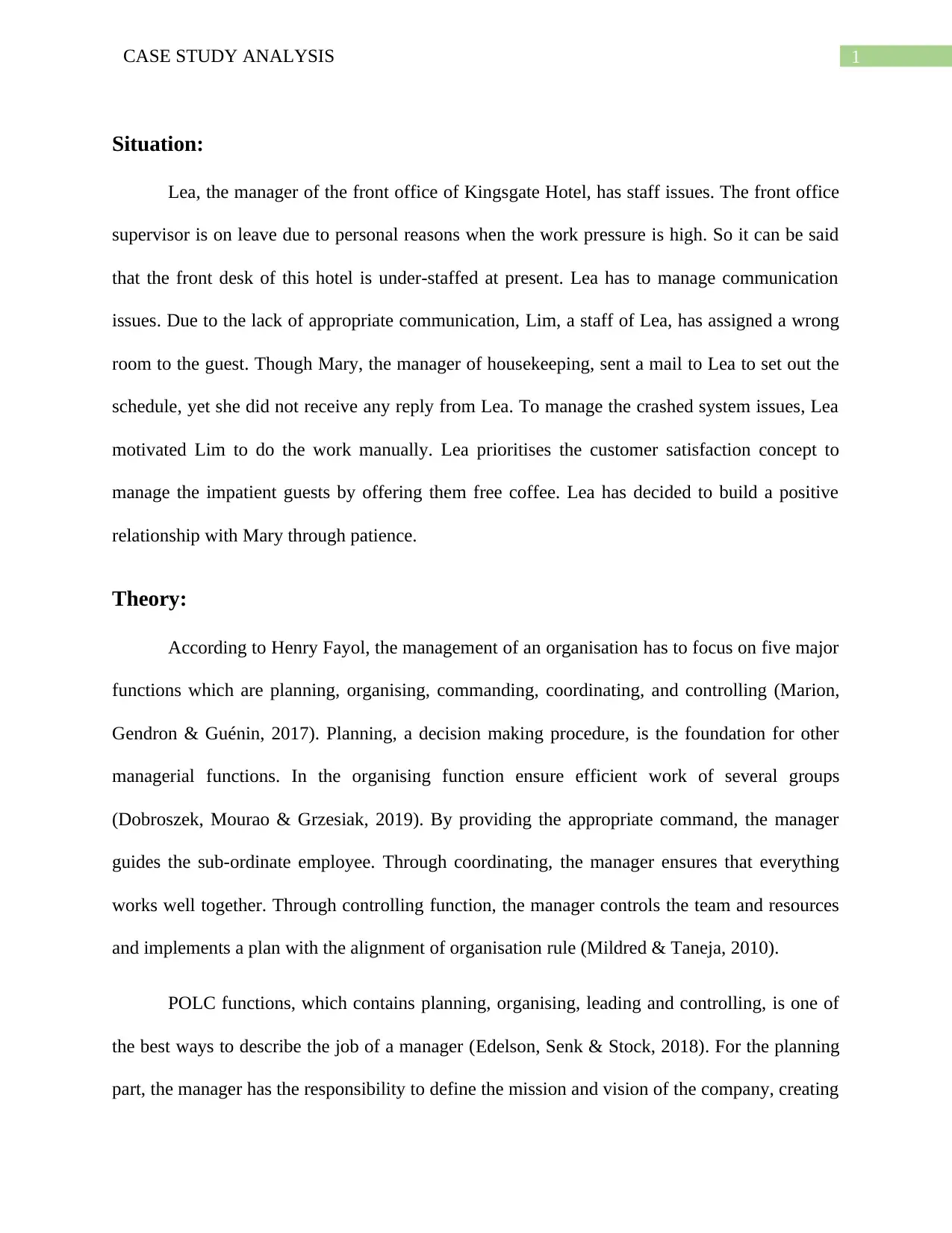
1CASE STUDY ANALYSIS
Situation:
Lea, the manager of the front office of Kingsgate Hotel, has staff issues. The front office
supervisor is on leave due to personal reasons when the work pressure is high. So it can be said
that the front desk of this hotel is under-staffed at present. Lea has to manage communication
issues. Due to the lack of appropriate communication, Lim, a staff of Lea, has assigned a wrong
room to the guest. Though Mary, the manager of housekeeping, sent a mail to Lea to set out the
schedule, yet she did not receive any reply from Lea. To manage the crashed system issues, Lea
motivated Lim to do the work manually. Lea prioritises the customer satisfaction concept to
manage the impatient guests by offering them free coffee. Lea has decided to build a positive
relationship with Mary through patience.
Theory:
According to Henry Fayol, the management of an organisation has to focus on five major
functions which are planning, organising, commanding, coordinating, and controlling (Marion,
Gendron & Guénin, 2017). Planning, a decision making procedure, is the foundation for other
managerial functions. In the organising function ensure efficient work of several groups
(Dobroszek, Mourao & Grzesiak, 2019). By providing the appropriate command, the manager
guides the sub-ordinate employee. Through coordinating, the manager ensures that everything
works well together. Through controlling function, the manager controls the team and resources
and implements a plan with the alignment of organisation rule (Mildred & Taneja, 2010).
POLC functions, which contains planning, organising, leading and controlling, is one of
the best ways to describe the job of a manager (Edelson, Senk & Stock, 2018). For the planning
part, the manager has the responsibility to define the mission and vision of the company, creating
Situation:
Lea, the manager of the front office of Kingsgate Hotel, has staff issues. The front office
supervisor is on leave due to personal reasons when the work pressure is high. So it can be said
that the front desk of this hotel is under-staffed at present. Lea has to manage communication
issues. Due to the lack of appropriate communication, Lim, a staff of Lea, has assigned a wrong
room to the guest. Though Mary, the manager of housekeeping, sent a mail to Lea to set out the
schedule, yet she did not receive any reply from Lea. To manage the crashed system issues, Lea
motivated Lim to do the work manually. Lea prioritises the customer satisfaction concept to
manage the impatient guests by offering them free coffee. Lea has decided to build a positive
relationship with Mary through patience.
Theory:
According to Henry Fayol, the management of an organisation has to focus on five major
functions which are planning, organising, commanding, coordinating, and controlling (Marion,
Gendron & Guénin, 2017). Planning, a decision making procedure, is the foundation for other
managerial functions. In the organising function ensure efficient work of several groups
(Dobroszek, Mourao & Grzesiak, 2019). By providing the appropriate command, the manager
guides the sub-ordinate employee. Through coordinating, the manager ensures that everything
works well together. Through controlling function, the manager controls the team and resources
and implements a plan with the alignment of organisation rule (Mildred & Taneja, 2010).
POLC functions, which contains planning, organising, leading and controlling, is one of
the best ways to describe the job of a manager (Edelson, Senk & Stock, 2018). For the planning
part, the manager has the responsibility to define the mission and vision of the company, creating
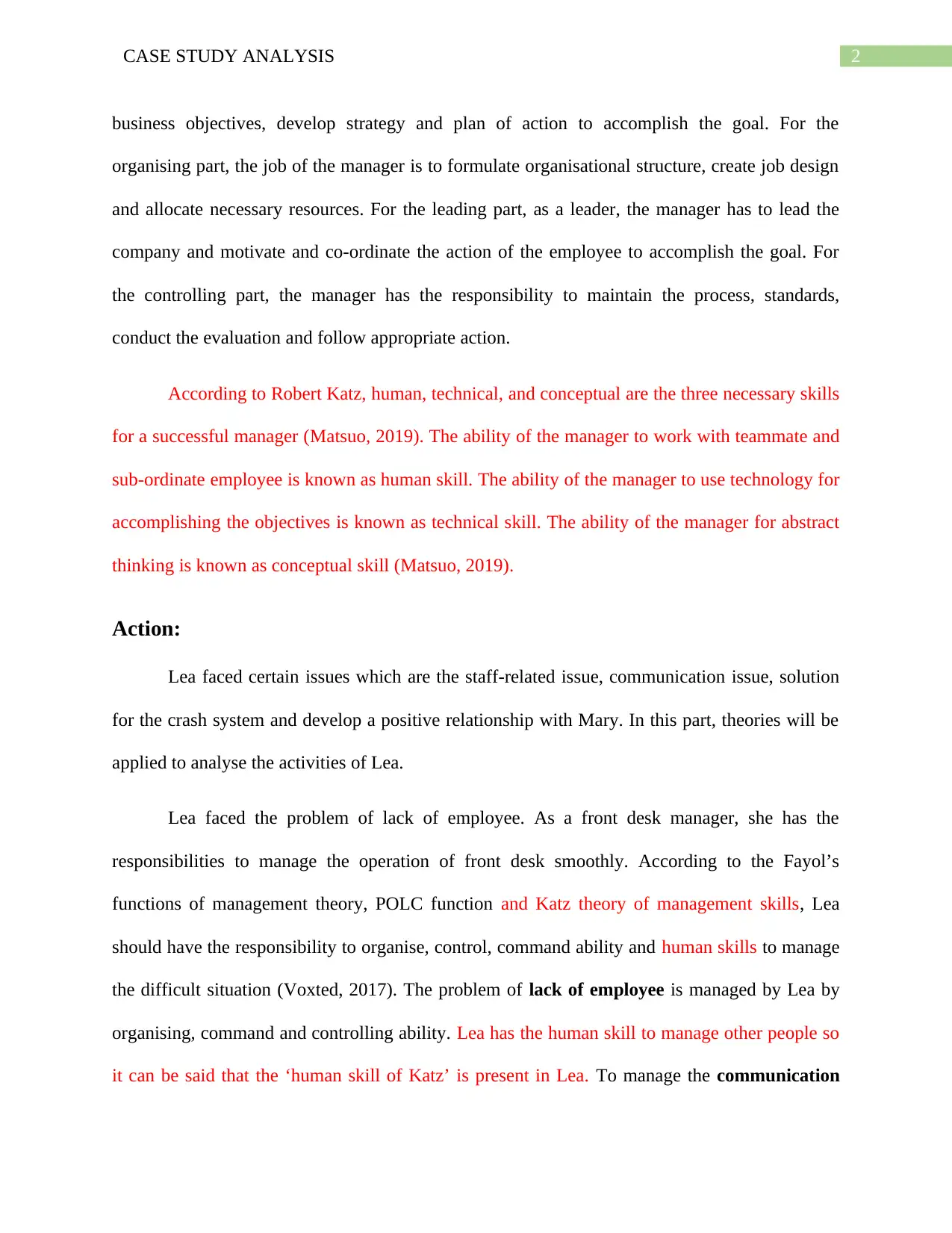
2CASE STUDY ANALYSIS
business objectives, develop strategy and plan of action to accomplish the goal. For the
organising part, the job of the manager is to formulate organisational structure, create job design
and allocate necessary resources. For the leading part, as a leader, the manager has to lead the
company and motivate and co-ordinate the action of the employee to accomplish the goal. For
the controlling part, the manager has the responsibility to maintain the process, standards,
conduct the evaluation and follow appropriate action.
According to Robert Katz, human, technical, and conceptual are the three necessary skills
for a successful manager (Matsuo, 2019). The ability of the manager to work with teammate and
sub-ordinate employee is known as human skill. The ability of the manager to use technology for
accomplishing the objectives is known as technical skill. The ability of the manager for abstract
thinking is known as conceptual skill (Matsuo, 2019).
Action:
Lea faced certain issues which are the staff-related issue, communication issue, solution
for the crash system and develop a positive relationship with Mary. In this part, theories will be
applied to analyse the activities of Lea.
Lea faced the problem of lack of employee. As a front desk manager, she has the
responsibilities to manage the operation of front desk smoothly. According to the Fayol’s
functions of management theory, POLC function and Katz theory of management skills, Lea
should have the responsibility to organise, control, command ability and human skills to manage
the difficult situation (Voxted, 2017). The problem of lack of employee is managed by Lea by
organising, command and controlling ability. Lea has the human skill to manage other people so
it can be said that the ‘human skill of Katz’ is present in Lea. To manage the communication
business objectives, develop strategy and plan of action to accomplish the goal. For the
organising part, the job of the manager is to formulate organisational structure, create job design
and allocate necessary resources. For the leading part, as a leader, the manager has to lead the
company and motivate and co-ordinate the action of the employee to accomplish the goal. For
the controlling part, the manager has the responsibility to maintain the process, standards,
conduct the evaluation and follow appropriate action.
According to Robert Katz, human, technical, and conceptual are the three necessary skills
for a successful manager (Matsuo, 2019). The ability of the manager to work with teammate and
sub-ordinate employee is known as human skill. The ability of the manager to use technology for
accomplishing the objectives is known as technical skill. The ability of the manager for abstract
thinking is known as conceptual skill (Matsuo, 2019).
Action:
Lea faced certain issues which are the staff-related issue, communication issue, solution
for the crash system and develop a positive relationship with Mary. In this part, theories will be
applied to analyse the activities of Lea.
Lea faced the problem of lack of employee. As a front desk manager, she has the
responsibilities to manage the operation of front desk smoothly. According to the Fayol’s
functions of management theory, POLC function and Katz theory of management skills, Lea
should have the responsibility to organise, control, command ability and human skills to manage
the difficult situation (Voxted, 2017). The problem of lack of employee is managed by Lea by
organising, command and controlling ability. Lea has the human skill to manage other people so
it can be said that the ‘human skill of Katz’ is present in Lea. To manage the communication
⊘ This is a preview!⊘
Do you want full access?
Subscribe today to unlock all pages.

Trusted by 1+ million students worldwide
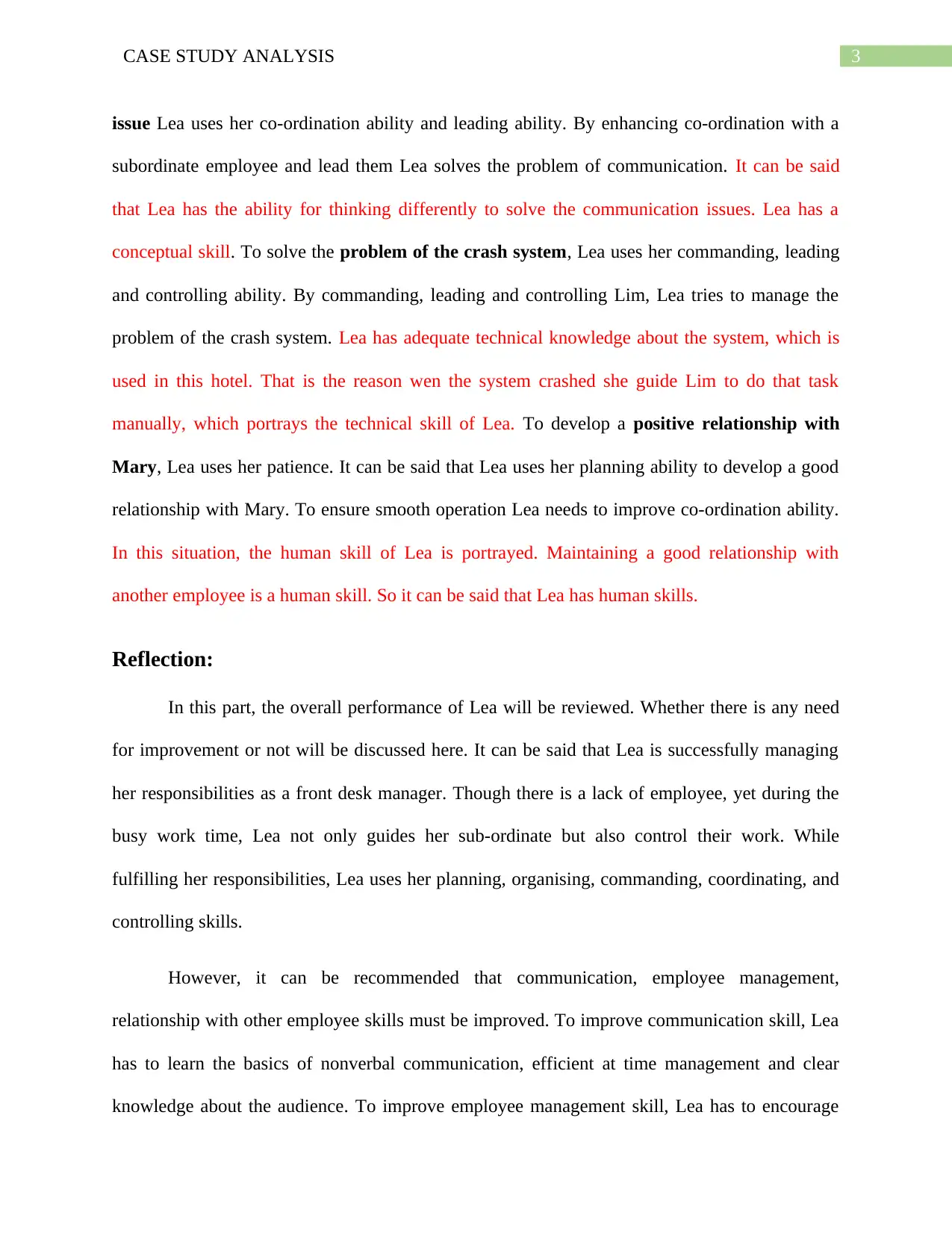
3CASE STUDY ANALYSIS
issue Lea uses her co-ordination ability and leading ability. By enhancing co-ordination with a
subordinate employee and lead them Lea solves the problem of communication. It can be said
that Lea has the ability for thinking differently to solve the communication issues. Lea has a
conceptual skill. To solve the problem of the crash system, Lea uses her commanding, leading
and controlling ability. By commanding, leading and controlling Lim, Lea tries to manage the
problem of the crash system. Lea has adequate technical knowledge about the system, which is
used in this hotel. That is the reason wen the system crashed she guide Lim to do that task
manually, which portrays the technical skill of Lea. To develop a positive relationship with
Mary, Lea uses her patience. It can be said that Lea uses her planning ability to develop a good
relationship with Mary. To ensure smooth operation Lea needs to improve co-ordination ability.
In this situation, the human skill of Lea is portrayed. Maintaining a good relationship with
another employee is a human skill. So it can be said that Lea has human skills.
Reflection:
In this part, the overall performance of Lea will be reviewed. Whether there is any need
for improvement or not will be discussed here. It can be said that Lea is successfully managing
her responsibilities as a front desk manager. Though there is a lack of employee, yet during the
busy work time, Lea not only guides her sub-ordinate but also control their work. While
fulfilling her responsibilities, Lea uses her planning, organising, commanding, coordinating, and
controlling skills.
However, it can be recommended that communication, employee management,
relationship with other employee skills must be improved. To improve communication skill, Lea
has to learn the basics of nonverbal communication, efficient at time management and clear
knowledge about the audience. To improve employee management skill, Lea has to encourage
issue Lea uses her co-ordination ability and leading ability. By enhancing co-ordination with a
subordinate employee and lead them Lea solves the problem of communication. It can be said
that Lea has the ability for thinking differently to solve the communication issues. Lea has a
conceptual skill. To solve the problem of the crash system, Lea uses her commanding, leading
and controlling ability. By commanding, leading and controlling Lim, Lea tries to manage the
problem of the crash system. Lea has adequate technical knowledge about the system, which is
used in this hotel. That is the reason wen the system crashed she guide Lim to do that task
manually, which portrays the technical skill of Lea. To develop a positive relationship with
Mary, Lea uses her patience. It can be said that Lea uses her planning ability to develop a good
relationship with Mary. To ensure smooth operation Lea needs to improve co-ordination ability.
In this situation, the human skill of Lea is portrayed. Maintaining a good relationship with
another employee is a human skill. So it can be said that Lea has human skills.
Reflection:
In this part, the overall performance of Lea will be reviewed. Whether there is any need
for improvement or not will be discussed here. It can be said that Lea is successfully managing
her responsibilities as a front desk manager. Though there is a lack of employee, yet during the
busy work time, Lea not only guides her sub-ordinate but also control their work. While
fulfilling her responsibilities, Lea uses her planning, organising, commanding, coordinating, and
controlling skills.
However, it can be recommended that communication, employee management,
relationship with other employee skills must be improved. To improve communication skill, Lea
has to learn the basics of nonverbal communication, efficient at time management and clear
knowledge about the audience. To improve employee management skill, Lea has to encourage
Paraphrase This Document
Need a fresh take? Get an instant paraphrase of this document with our AI Paraphraser
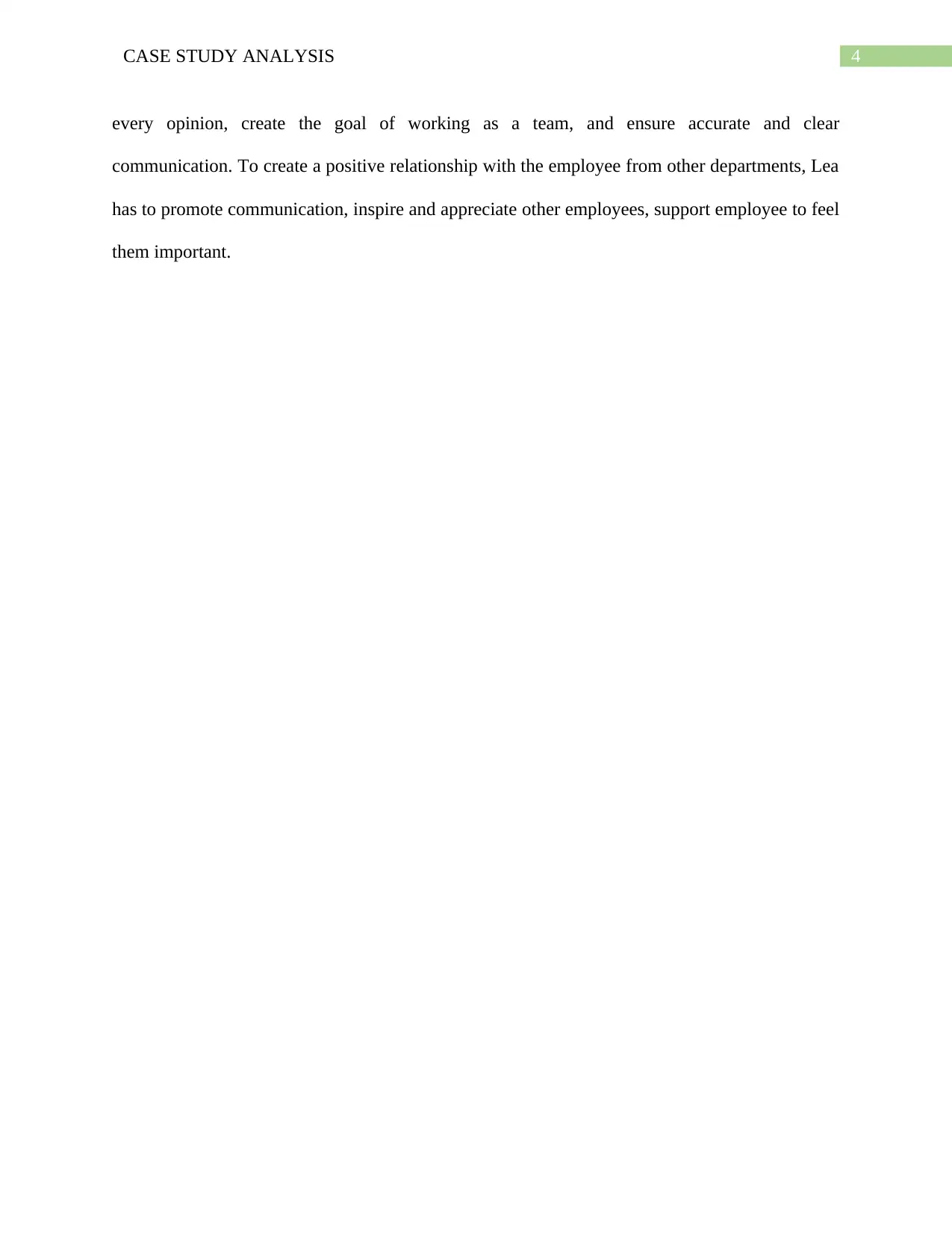
4CASE STUDY ANALYSIS
every opinion, create the goal of working as a team, and ensure accurate and clear
communication. To create a positive relationship with the employee from other departments, Lea
has to promote communication, inspire and appreciate other employees, support employee to feel
them important.
every opinion, create the goal of working as a team, and ensure accurate and clear
communication. To create a positive relationship with the employee from other departments, Lea
has to promote communication, inspire and appreciate other employees, support employee to feel
them important.
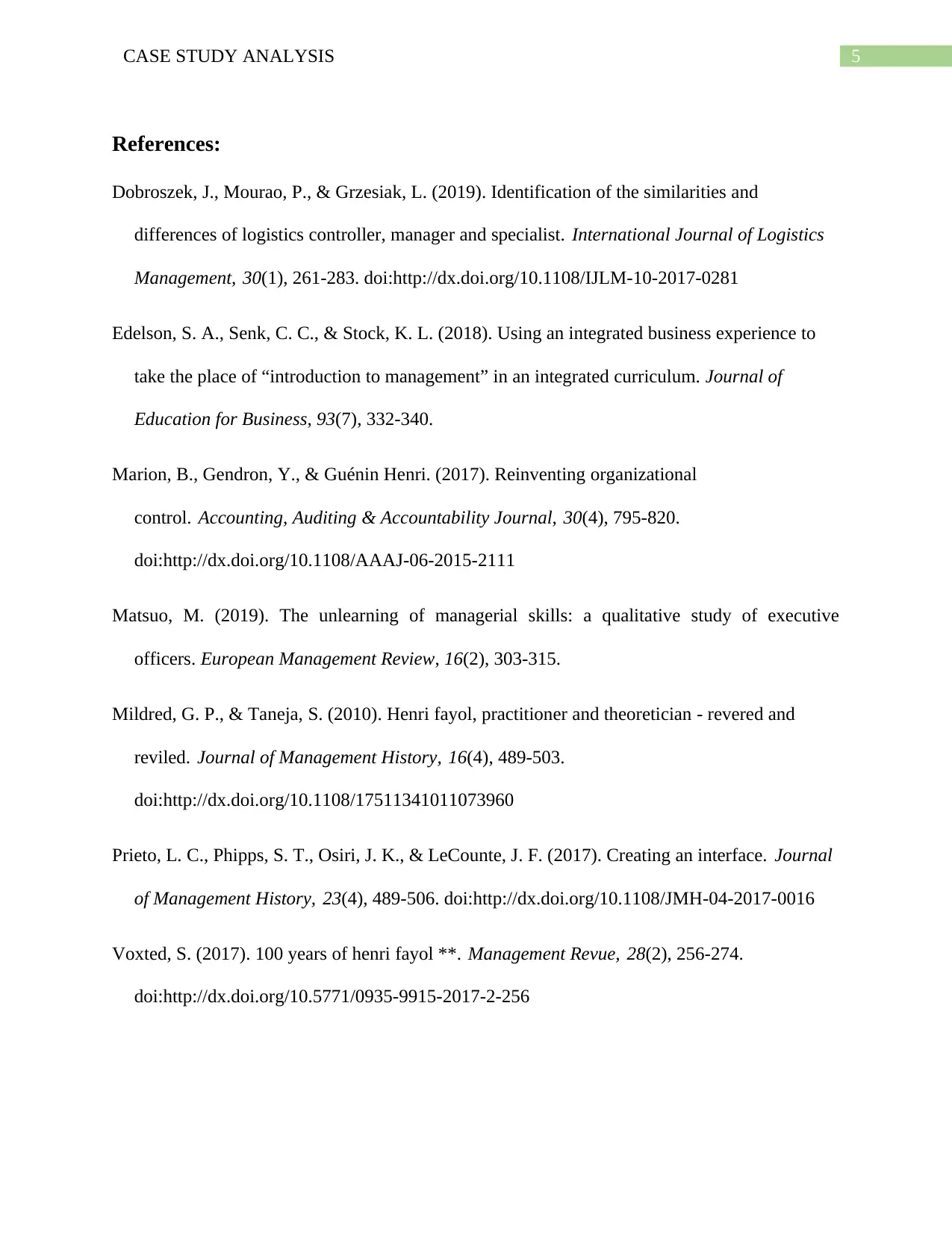
5CASE STUDY ANALYSIS
References:
Dobroszek, J., Mourao, P., & Grzesiak, L. (2019). Identification of the similarities and
differences of logistics controller, manager and specialist. International Journal of Logistics
Management, 30(1), 261-283. doi:http://dx.doi.org/10.1108/IJLM-10-2017-0281
Edelson, S. A., Senk, C. C., & Stock, K. L. (2018). Using an integrated business experience to
take the place of “introduction to management” in an integrated curriculum. Journal of
Education for Business, 93(7), 332-340.
Marion, B., Gendron, Y., & Guénin Henri. (2017). Reinventing organizational
control. Accounting, Auditing & Accountability Journal, 30(4), 795-820.
doi:http://dx.doi.org/10.1108/AAAJ-06-2015-2111
Matsuo, M. (2019). The unlearning of managerial skills: a qualitative study of executive
officers. European Management Review, 16(2), 303-315.
Mildred, G. P., & Taneja, S. (2010). Henri fayol, practitioner and theoretician - revered and
reviled. Journal of Management History, 16(4), 489-503.
doi:http://dx.doi.org/10.1108/17511341011073960
Prieto, L. C., Phipps, S. T., Osiri, J. K., & LeCounte, J. F. (2017). Creating an interface. Journal
of Management History, 23(4), 489-506. doi:http://dx.doi.org/10.1108/JMH-04-2017-0016
Voxted, S. (2017). 100 years of henri fayol **. Management Revue, 28(2), 256-274.
doi:http://dx.doi.org/10.5771/0935-9915-2017-2-256
References:
Dobroszek, J., Mourao, P., & Grzesiak, L. (2019). Identification of the similarities and
differences of logistics controller, manager and specialist. International Journal of Logistics
Management, 30(1), 261-283. doi:http://dx.doi.org/10.1108/IJLM-10-2017-0281
Edelson, S. A., Senk, C. C., & Stock, K. L. (2018). Using an integrated business experience to
take the place of “introduction to management” in an integrated curriculum. Journal of
Education for Business, 93(7), 332-340.
Marion, B., Gendron, Y., & Guénin Henri. (2017). Reinventing organizational
control. Accounting, Auditing & Accountability Journal, 30(4), 795-820.
doi:http://dx.doi.org/10.1108/AAAJ-06-2015-2111
Matsuo, M. (2019). The unlearning of managerial skills: a qualitative study of executive
officers. European Management Review, 16(2), 303-315.
Mildred, G. P., & Taneja, S. (2010). Henri fayol, practitioner and theoretician - revered and
reviled. Journal of Management History, 16(4), 489-503.
doi:http://dx.doi.org/10.1108/17511341011073960
Prieto, L. C., Phipps, S. T., Osiri, J. K., & LeCounte, J. F. (2017). Creating an interface. Journal
of Management History, 23(4), 489-506. doi:http://dx.doi.org/10.1108/JMH-04-2017-0016
Voxted, S. (2017). 100 years of henri fayol **. Management Revue, 28(2), 256-274.
doi:http://dx.doi.org/10.5771/0935-9915-2017-2-256
⊘ This is a preview!⊘
Do you want full access?
Subscribe today to unlock all pages.

Trusted by 1+ million students worldwide
1 out of 6
Related Documents
Your All-in-One AI-Powered Toolkit for Academic Success.
+13062052269
info@desklib.com
Available 24*7 on WhatsApp / Email
![[object Object]](/_next/static/media/star-bottom.7253800d.svg)
Unlock your academic potential
Copyright © 2020–2026 A2Z Services. All Rights Reserved. Developed and managed by ZUCOL.




